In my experience, using a specialized oil stain remover can effectively restore the cleanliness and appearance of asphalt pavements. Using a specialized oil stain remover is indeed a practical and effective way to clean oil stains from asphalt pavements. Asphalt, a petroleum-based product, is prone to staining from oil, which can penetrate its surface and cause deterioration over time, not to mention unsightly stains that detract from the appearance of a driveway or parking lot.
Removing Stubborn Oil Stains from Asphalt Driveways
Start by identifying the type of oil, as different stains may require specific removal methods. For fresh automotive leaks, absorbent materials like cat litter can quickly soak up the spill before it sets in.
Oil Stain Removal Methods
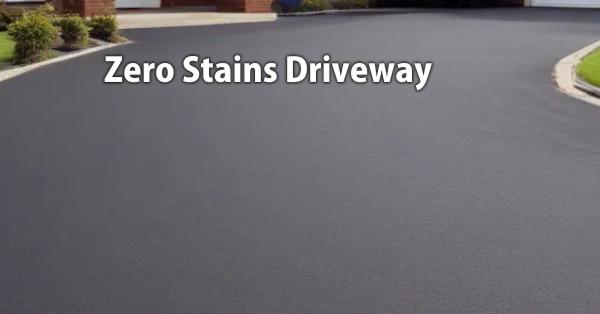
Absorbent Materials
I recommend keeping a supply of materials like cat litter, sawdust, or oil-absorbent pads on hand for quick spill cleanup. These materials help to soak up the oil and prevent it from seeping deeper into the asphalt surface.
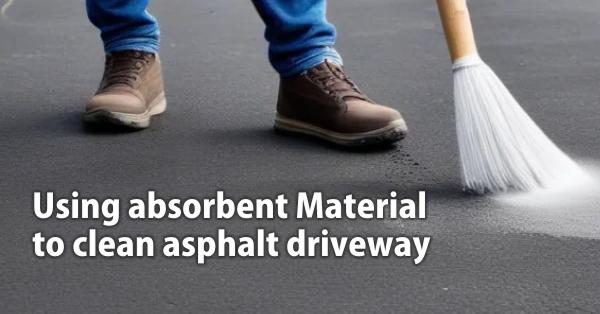
Benefits of Using Cat Litter As Best Oil Stain Remover
Absorbs oil and grease effectively
Readily available and inexpensive
Can be used for fresh spills or set-in stains
Helps prevent stains from spreading or seeping deeper into the asphalt
Meets standards for biodegradability and environmental friendliness
Diatomaceous Earth
Highly absorbent and effective for oil and grease stains
Meets standards for non-flammability and chemical inertness
Can be used for both fresh spills and set-in stains
Conforms to guidelines for safe handling and disposal
Meets environmental standards for biodegradability and non-toxicity
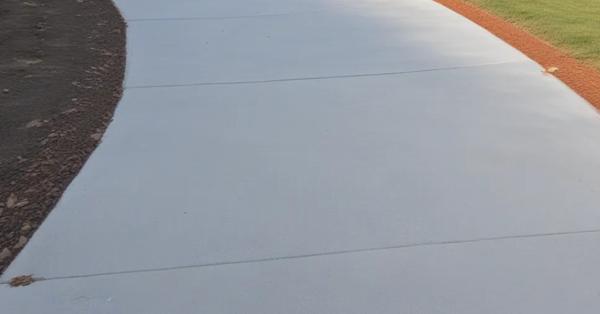
Chemical Cleaners
For stubborn or set-in oil stains, chemical cleaners can be an effective solution. I have had success with various commercial cleaners specifically formulated for oil stain removal on asphalt surfaces. However, it’s important to follow the manufacturer’s instructions carefully and take appropriate safety precautions when using these products.
Effective Chemical Cleaners Data Table
| Product | Active Ingredients | Recommended Use |
|---|---|---|
| Oil Eater Cleaner Degreaser | Sodium hydroxide, surfactants | Heavy-duty oil stain removal on asphalt and concrete. |
| Terminator-HSD Concrete Cleaner | Proprietary blend of solvents and surfactants | Effective for removing oil, grease, and tire marks from asphalt and concrete. |
| Act Concrete Cleaner | Sodium metasilicate, surfactants | Safe for use on asphalt and concrete surfaces, ideal for oil and grease stains. |
Always follow safety guidelines and wear appropriate personal protective equipment (PPE) when using chemical cleaners.
Pressure Washing
In some cases, the combination of high-pressure water and specialized cleaning solutions can effectively remove oil stains from asphalt surfaces. I have found that pressure washing works best for fresh or surface-level stains and may require multiple passes or the use of heated water for more stubborn stains.
Bioremediation
For environmentally-conscious clients, bioremediation can be an effective and eco-friendly approach to oil stain removal. This method involves the use of specialized bacteria or enzymes that break down and digest the oil, leaving behind a clean surface. While the process may take longer than chemical treatments, it is a safe and sustainable option for sensitive areas or long-term maintenance.
Heat Treatment
In certain situations, heat treatment can be an effective method for removing oil stains from asphalt surfaces. This technique involves the use of specialized equipment that heats the asphalt surface, causing the oil to liquefy and rise to the surface, where it can be absorbed or removed. However, this method should only be undertaken by trained professionals due to the high temperatures involved and the potential for damage to the asphalt if not done properly.
Baking Soda & Dish Soap
A simple yet effective DIY solution involves creating a paste with baking soda and dish soap. I have found that this mixture can help break down and lift oil stains from asphalt surfaces. Simply apply the paste to the stain, let it sit for a few hours, and then scrub and rinse with hot water.
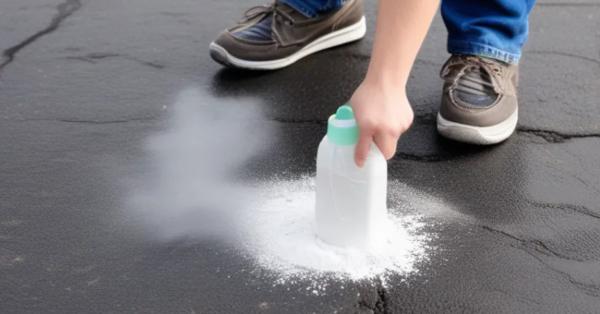
Vinegar & Hot Water
The acidic properties of vinegar can help cut through oil and grease stains. I recommend mixing equal parts of vinegar and hot water, applying the solution to the stain, and letting it sit for several minutes before scrubbing and rinsing.
WD-40 & Sawdust
For stubborn oil stains, the combination of WD-40 and sawdust can be surprisingly effective. Spray the WD-40 onto the stain, allowing it to penetrate, then sprinkle sawdust over the area. Let it sit for a few hours, then sweep up the sawdust, which should have absorbed the oil.
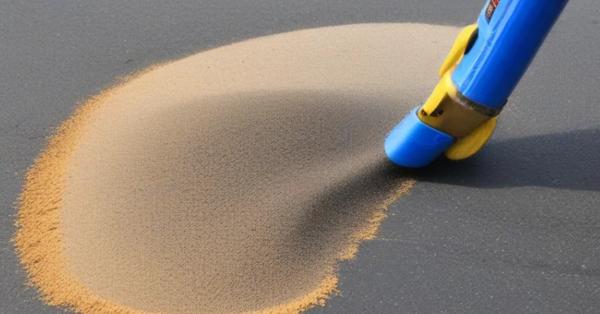
Coca-Cola & Kitty Litter
While it may seem unconventional, the combination of Coca-Cola and kitty litter can be an effective DIY solution for oil stain removal. The acidity in the soda helps break down the oil, while the kitty litter absorbs the liquid. Pour the soda onto the stain, let it sit for a few minutes, then cover with kitty litter and let it sit for several hours before sweeping it up.
Hydrogen Peroxide & Detergent
A mixture of hydrogen peroxide and dish detergent can be an eco-friendly and effective DIY solution for oil stain removal. The hydrogen peroxide acts as a mild bleaching agent, while the detergent helps lift and dissolve the oil. Mix the two ingredients, apply to the stain, let it sit for a few hours, and then scrub and rinse.
Trisodium Phosphate for Asphalt Driveway Oil Stain Remover
If you prefer a more eco-friendly approach, consider using trisodium phosphate (TSP) to remove old oil stains from asphalt. This heavy-duty cleaner is often used to remove oil stains and grease stains without harsh chemicals. It can be used on concrete driveways to remove tough stains.
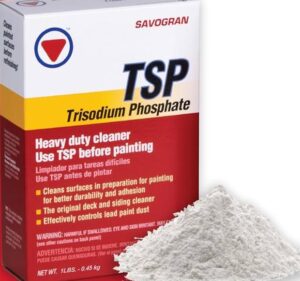
Simply create a TSP solution with hot water, apply it generously onto the oil spot, and let it sit for at least 30 minutes. Then, grab a stiff bristle brush and vigorously scrub the stain to lift the oil from the porous asphalt surface. TSP is an excellent choice for stain removal on asphalt and concrete surfaces, and it can even help remove stubborn transmission fluid stains.
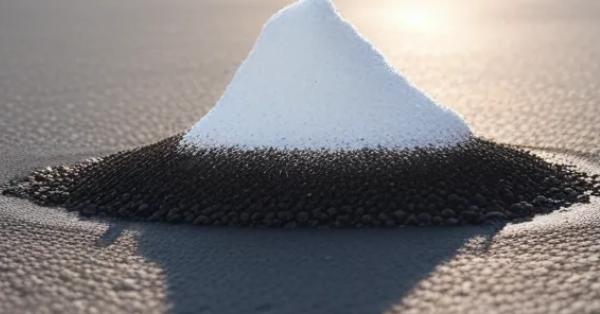
Top Commercial Oil Stain Removers
| Product | Key Features | Best For |
|---|---|---|
| Oil Eater Cleaner Degreaser | Concentrated formula, biodegradable | Heavy-duty oil and grease stain removal on asphalt and concrete surfaces. |
| Terminator-HSD Concrete Cleaner | Fast-acting, low-odor | Removing oil, grease, and tire marks from asphalt and concrete. Ideal for commercial or industrial applications. |
| Act Concrete Cleaner | Safe for indoor and outdoor use, low-VOC | Oil and grease stain removal on asphalt and concrete surfaces, suitable for residential and commercial use. |
| Krud Kutter Oil Grabber Stain Remover | Rapid oil-dissolving action, concentrated formula | Removing stubborn oil stains from asphalt, concrete, and other surfaces. |
| Black Diamond Stoneworks Asphalt Cleaner | Biodegradable, low-odor | Effective for cleaning and removing oil stains from asphalt surfaces, while being environmentally friendly. |
Always follow the manufacturer’s instructions carefully and take appropriate safety precautions when using commercial oil stain removers.
Certified Gurus’ Answers
What makes oil stains on asphalt so difficult to remove?
I have found that oil stains on asphalt are particularly stubborn because the porous nature of asphalt allows the oil to seep deep into the surface. This makes it challenging to remove the stain using regular cleaning methods. The longer the stain sits, the more it sets in, making it even harder to tackle.
What are the best products to use for removing oil stains from asphalt?
In my experience, the best oil stain removers for asphalt are those that contain powerful degreasers and absorbents. Look for products specifically formulated for asphalt or concrete surfaces, as they are designed to penetrate deep and break down the oil molecules. Enzyme-based cleaners and powdered absorbents are also highly effective.
How do I prepare the surface before applying an oil stain remover?
Proper surface preparation is crucial for optimal results. First, I recommend sweeping or blowing away any loose debris from the stained area. Next, use a degreaser or hot water to remove any surface oil or grime. This will help the stain remover penetrate the asphalt more effectively.
Can harsh chemicals damage asphalt when removing oil stains?
Yes, some harsh chemicals can potentially damage or discolor asphalt surfaces if not used correctly. It’s essential to follow the product instructions carefully and avoid using highly acidic or caustic solutions unless specifically designed for asphalt. Always test the product on a small, inconspicuous area first to ensure it won’t cause any adverse effects.
Is there a specific technique for applying oil stain removers on asphalt?
Absolutely! For best results, I recommend applying the stain remover liberally and allowing it to dwell for the recommended time before scrubbing or agitating the surface. Agitation helps work the product into the stain and dislodge the oil. Use a stiff-bristled brush or broom for scrubbing, and reapply the product as needed for stubborn stains.
How can I prevent future oil stains on my asphalt surface?
Preventing oil stains is always easier than removing them. I suggest regularly cleaning the asphalt surface to remove any spills or leaks promptly. Applying a sealant or protective coating can also help create a barrier against oil penetration. Additionally, identifying and addressing the source of any leaks from vehicles or equipment is crucial to avoid recurring stains.
